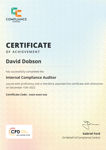
Database Administrator
Empower Your Career | CPD Certified Course | FREE PDF Certificates | Lifetime Access | Free Exam & Assessment
Compliance Central
Summary
- CPD Accredited PDF Certificate - Free
- CPD Accredited Hard Copy Certificate - £10.79
- Exam(s) / assessment(s) is included in price
- Tutor is available to students
Add to basket or enquire
Overview
***Want to Unlock the Secrets of Data? Become a Database Mastermind!***
The world runs on data, and Database Administrators (DBAs) are the heroes behind the scenes ensuring its smooth operation. Database administrators in the UK are in high demand, with an average salary of £41,501 per year. The job market is expected to grow by 9% in the next few years, so now is a great time to start a career as a database administrator. As a database administrator, you will be responsible for the design, implementation, and maintenance of databases. You will also be responsible for ensuring the security and integrity of the data. If you are interested in a challenging and rewarding career in technology, then database administration is a great option for you.
Our Database Administrator course starts with the basics of Database Administrator and gradually progresses towards advanced topics. Therefore, each lesson of this Database Administrator course is intuitive and easy to understand.
Learning OutcomesBy the end of this Database Administrator course, you'll be able to:
- Install and configure MySQL Server and MySQL Workbench.
- Create, manage, and manipulate databases and tables using SQL.
- Insert, update, and delete data efficiently.
- Design and implement database relationships to ensure data integrity.
- Utilize aggregate functions to summarize and analyze data.
- Reverse engineer existing databases and forward engineer data models.
Why would you choose the Database Administrator course from Compliance Central:
- Lifetime access to Database Administrator course materials
- Full tutor support is available from Monday to Friday with the Database Administrator course
- Learn Database Administrator skills at your own pace from the comfort of your home
- Gain a complete understanding of Database Administrator course
- Accessible, informative Database Administrator learning modules designed by experts
- Get 24/7 help or advice from our email and live chat teams with the Database Administrator
- Study Database Administrator in your own time through your computer, tablet or mobile device
- A 100% learning satisfaction guarantee with your Database Administrator Course
Certificates
CPD Accredited PDF Certificate
Digital certificate - Included
CPD Accredited PDF Certificate
CPD Accredited Hard Copy Certificate
Hard copy certificate - £10.79
CPD Accredited Hard Copy Certificate
Delivery Charge:
- Inside the UK: Free
- Outside of the UK: £9.99 each
CPD
Course media
Description
★★ Database Administrator ★★
Curriculum Breakdown of the Database Administrator Course
Unit 01: Introduction
Gain foundational knowledge of MySQL Server and databases, including installation and initial setup.
- Module 01: Introduction to MySQL Server and Databases
- Module 02: Download and Install MySQL Server and MySQL Workbench
Unit 02: Manipulating Tables and Data - CRUD Operations
Learn to manage databases through creating, reading, updating, and deleting (CRUD) data in SQL and MySQL Workbench.
- Module 01: Connect and Create a Database
- Module 02: Drop or Remove Database
- Module 03: Create an SQL Database Table
- Module 04: Insert Data into the Table with SQL Script
- Module 05: Insert Data into the Table with Workbench
- Module 06: Select Data from the Table with SQL Script
- Module 07: Select Data with Filters
- Module 08: Update Data in the Table
- Module 09: Delete Data from the Table
- Module 10: Reverse Engineer Database into Model
- Module 11: Forward Engineer Data Model into Database
Unit 03: Relationships and Foreign Keys
Understand and implement relationships, foreign keys, and normalization in databases, enhancing data integrity and querying capabilities.ys
- Module 01: What are Relationships, Foreign Keys and Normalization?
- Module 02: Create Relationships with Data Modeling
- Module 03: Create Relationships with Workbench Table Design Tool
- Module 04: Insert Records in Related Tables
- Module 05: Run Queries on Related Tables (Inner Joins)
- Module 06: Left, Right and Cross-Joins
Unit 04: Aggregate Functions
Explore aggregate functions to perform calculations on data sets, including grouping, averaging, counting, and summing data.
- Module 01: Grouping Data using SQL GROUP BY Clause
- Module 02: SQL AVG Aggregate Function
- Module 03: SQL COUNT Aggregate Function
- Module 04: SQL MIN & MAX Aggregate Functions
- Module 05: SQL SUM Aggregate Function
- Module 06: Splitting Groups using HAVING Clause
Who is this course for?
This Database Administrator course is ideal for:
- Individuals with an interest in data management and database systems.
- IT professionals seeking to expand their skillset and transition into a Database Administrator role.
- Business analysts who want to gain a deeper understanding of data structures and manipulation techniques.
- Anyone passionate about building and maintaining robust and efficient databases.
- Those looking to enhance their career prospects in the ever-growing field of data.
Requirements
To enrol in this Database Administrator course, all you need is a basic understanding of the English Language and an internet connection.
Career path
A successful career as a Database Administrator can open doors to exciting opportunities. Here are some potential career paths to consider:
- Database Administrator
- Database Analyst
- Database Architect
- Data Warehouse Specialist
- Business Intelligence Analyst
- Data Scientist (with further specialization)
- Database Security Specialist
Questions and answers
Currently there are no Q&As for this course. Be the first to ask a question.
Reviews
Currently there are no reviews for this course. Be the first to leave a review.
Legal information
This course is advertised on reed.co.uk by the Course Provider, whose terms and conditions apply. Purchases are made directly from the Course Provider, and as such, content and materials are supplied by the Course Provider directly. Reed is acting as agent and not reseller in relation to this course. Reed's only responsibility is to facilitate your payment for the course. It is your responsibility to review and agree to the Course Provider's terms and conditions and satisfy yourself as to the suitability of the course you intend to purchase. Reed will not have any responsibility for the content of the course and/or associated materials.





